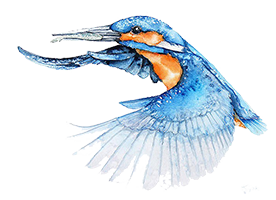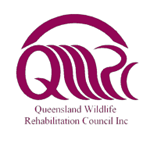
Queensland Wildlife Rehabilitation Council
What To Do With Injured Wildlife
Only permitted wildlife rehabilitators are allowed to provide long term care for sick, injured or orphaned wildlife (see “How to become a wildlife rehabilitator” for further information).
Wildlife in distress should be taken to a local wildlife rehabilitator or a veterinarian for care and treatment. Contact a local wildlife rehabilitation group for help (view here) or call RSPCA Qld on 1300 ANIMAL (1300 264 625) for further assistance.
Here is how you can help
- Make sure you are safe.
- Only handle an injured animal if you know how to.
- Do not handle any bat (flying foxes or microbats) unless you have been trained and you have a current vaccination against Australian bat lyssavirus (ABL). Call a local care group or RSPCA Qld on 1300 ANIMAL (1300 264 625) immediately.
- Injured wild animals won’t want to be handled. They are likely to defend themselves and may try to escape. Handle them so that they won’t struggle and worsen their injury.
- If possible, remove the animal from the threat (e.g. take it off a road or out of a swimming pool).
- Wear gloves or use a thick towel (or jumper) to restrain the animal. This will protect you from scratches or bites.
- Put the animal in a warm, quiet, enclosed space as quickly as possible (e.g. wrap it in a towel and place it in a secure cardboard box). Make sure the container has adequate ventilation.
- The animal’s survival may depend on it being kept warm and quiet in the dark and away from children, domestic animals and noise. Avoid opening the container to look at the animal or to show it to others.
- Do not give sick, injured or orphaned animals anything to eat or drink.
- When transporting an injured animal, restrain the container inside a vehicle and cover it so that the animal can’t escape.
- Make sure you tell the wildlife carer or vet receiving the animal where you found the animal, so it can be released back to the same area when it has recovered. This information helps to identify and manage ‘black spots’—where significant numbers of sick or injured wild animals are being found
For assistance take the animal to the nearest vet, contact a local wildlife rehabilitation group for help (view here) or call RSPCA Qld on 1300 ANIMAL (1300 264 625).
Birds
- First determine that the bird really needs rescuing.
- It is an old wives tale that parents reject young touched by humans.
- Handle the bird as little as possible to prevent injury and be aware of sharp claws and beaks.
- Do not give the bird any food or water.
- Try to identify the parent bird and find the nest. Always try to put uninjured baby birds back in the nest or as close as you can to where the nest is. Remember it could be a ground dwelling bird.
- If you can’t locate the original nest or can’t reach it you can construct a makeshift nest; a margarine or ice-cream container, bucket, or a hanging basket is ideal. Ensure that any makeshift nest has drainage holes. You could add a stick for perching. Put dried leaves, grass and twigs in the bottom.
- Attach the nest to a branch or structure in a shaded position as close as possible to the original nest. Place the baby bird in the nest and check to ensure the parents are feeding it. It may be necessary to pick the bird up on more than one occasion – please persevere if the parents are feeding the chick it won’t take long till the chick can fly.
- If the adults are not feeding the chick after several hours or if the bird is showing signs of injury or illness please take the animal to your nearest vet or contact your local wildlife group or call RSPCA 1300 ANIMAL (1300 264 625) for assistance.
It is important to note that sick and injured wild animals that cannot be rehabilitated have to be euthanised by a vet or wildlife carer. This may be the only option when an animal is in pain or cannot survive as a wild animal.
Marsupials [Kangaroos , possums or Koala]
- If an injured adult is found on the ground, cover at least the animal’s head with something e.g. a blanket, towel or jumper to reduce its stress. Contact your local wildlife group or call RSPCA 1300 ANIMAL (1300 264 625) for assistance.
- Remove dead animals from the road when possible to reduce the possibility of further injury to humans or wildlife.
- Check for life, if the animal is dead, check for a pouch, it’s where the belly button would be. There may be a live joey in there.
If the joey is furless, do not forcibly remove it from its mother’s teat as this will cause further injury even death. Only if mum is dead, and you feel comfortable to do so, use a pair of scissors to cut the teat as close as possible to the mother’s pouch. If possible, attach a safety pin to the end of the teat to stop the joey from swallowing it. If you are not comfortable cutting the teat then take the deceased adult with the baby still in the pouch to the vet or wildlife carer. - If you find orphaned or injured marsupial babies that are not attached to a teat place them in a pillowcase or hankie fashioned as a substitute pouch. This can then be placed down your shirt for warmth.
- Please take the animal to your nearest vet or contact your local wildlife group or call RSPCA 1300 ANIMAL (1300 264 625) for assistance.
Echidnas
- You are often first alerted to the presence of an echidna in your yard by a barking dog at night. Echidnas will usually be “just passing through” your property. Please remove your dog from the yard and secure the dog well away from the echidna for the night – inside the house, in a laundry or garage. By morning the echidna will usually be gone but if not please seek further assistance before the dog is released
- Please do not attempt to remove an echidna from your yard as you could take a mother away from young left in a burrow.
- Do not attempt to give the animal any food or water.
Other special contacts for unique species
For reports or enquiries regarding crocodile sightings or injured cassowaries in Queensland, please call the Department of Environment and Heritage Protection on 1300 130 372.
For reporting C3 bat (a bat that has bitten or scratched a person, or the person has had exposure to the bat’s saliva or neural tissue), contact Queensland Health on 13HEALTH (13 43 25 84). Wash the bite or scratch wound gently but thoroughly with soap and water for at least five minutes. Do not scrub the wound. Apply an antiseptic and cover the wound. If bat saliva gets into eyes, nose or mouth, or into an open wound, flush thoroughly with water. Seek immediate medical advice from your doctor or local hospital. If a pet or livestock has been bitten or scratched by a bat, contact your local veterinarian.
To report sick, injured or orphaned wildlife, marine animal strikes or marine animal strandings, please call RSPCA Qld on 1300 ANIMAL (1300 264 625).
If you witness or suspect an offence to wildlife please visit this site https://www.des.qld.gov.au/contactus/feedback-form-complaint and complete the form found near the bottom of the page
QWRC has, in good faith, given directions for the assistance of sick, injured or orphaned native wildlife but incurs no liability for the actions taken or decisions made.

